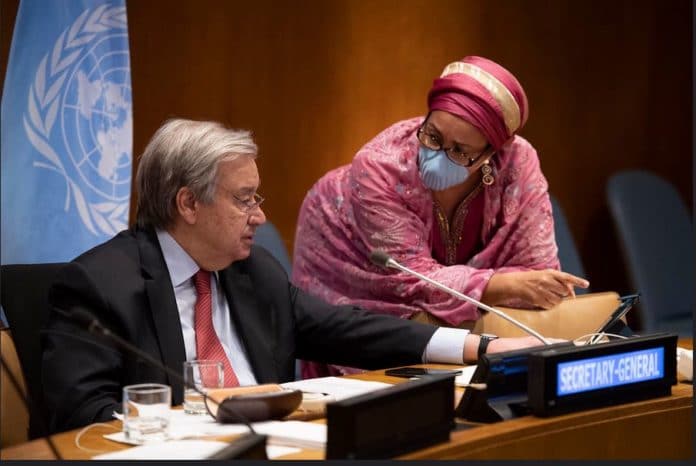Note to Correspondents on the Launch of Discussion Groups of the Financing for Development in the Era of COVID-19 and Beyond
Today’s virtual event, convened by Minister of Foreign Affairs of Canada François-Philippe Champagne, Minister of Foreign Affairs and Foreign Trade of Jamaica Kamina Johnson-Smith and United Nations Deputy Secretary-General Amina Mohammed, was the first milestone since the High-Level Event on Financing for Development in the Era of COVID-19 and Beyond which had brought over 50 Heads of State and Government on 28 May 2020.
Six discussion groups were launch to serve as an open space where governments, UN entities and institutional partners, the private sector, civil society and thought leaders can discuss areas that require critical multilateral engagement to respond to the socio-economic disruptions of the COVID-19 pandemic, such as external finance, remittance, jobs and inclusive growth; recovering better for sustainability; global liquidity and financial stability; debt vulnerability; private sector creditor engagement; and illicit financial flows.
These topics reflect the world’s most urgent global financing issues. Faced with the pandemic, fiscal space in developing countries has been squeezed by a sharply reduced tax base and persisting illicit financial flows on one hand, and skyrocketing health expenditures and stimulus packages on the other. Many countries are faced with the impossible dilemma of either servicing debts or investing in sustainable development. Debt standstills (such as the G20 moratorium) and relief, global liquidity and increased financial flows from all sources, and effectively combating illicit financial flows will all be key to preventing the current recession from turning into a long-lasting depression. Countries and regional organisations joined in co-leading six discussion groups as follows:
- External finance, remittances, jobs and inclusive growth: Egypt and Japan;
- Recovering better for sustainability: Fiji, Rwanda, United Kingdom and the European Union;
- Global liquidity and financial stability: Costa Rica;
- Debt vulnerability: Pakistan, the Netherlands and the African Union;
- Private sector creditor engagement: Senegal;
- Illicit financial flows: Barbados and Nigeria
In addition, country representatives emphasized the tremendous opportunity that this crisis offers to rebuild a new and more resilient world. They also highlighted the need to work in an integrated and multi-stakeholder manner across all topics; the importance of a people-centred approach and enhanced digital access with due regard to the principle of leaving no one behind, least of all women; and the Sustainable Development Goals as a blueprint for recovery. “This crisis demonstrated the consequences of ignoring our pursuit for sustainable development. We simply cannot continue to push planetary boundaries at the pace the world has been practicing to this day”, Ms Johnson-Smith said.
Speakers also recognized the strong political momentum that the High-Level Event had created and the responsibility of the international community to identify practical and concrete solutions to the development crisis caused by the pandemic. Several participants noted that exacerbated debt vulnerability cannot hamper our efforts to invest in the Sustainable Development Goals, especially as we accelerate our work in the Decade of Action for Sustainable Development.
The next steps include convening the six discussion groups at least three times each to discuss and identify options and recommendations specific to their area of focus. The results will be the basis of the engagement of Ministers of Finance at a high-level meeting scheduled for 8 September 2020.
“The COVID-19 crisis continues to test many countries’ social, economic and political resilience, with consequences for lives and livelihoods. We must work together to support a strong recovery and ensure that the impacts of the pandemic will not compromise hard won development gains,” Mr Champagne said. To this end, Deputy Secretary-General Amina Mohamed added, “the changes we propose should address the unique nature of the fallout of this pandemic and close the gap between where we are today, and where the world needs to be in 2030”.

